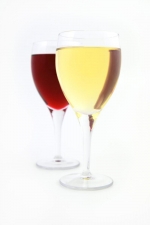
By Miriam Raftery
March 20, 2015 (San Diego’s East County)--A class action lawsuit has been filed by four individuals on behalf of California consumers who purchased certain wines in the past four years. The suit was filed against 28 California wineries, claiming that their wines have high levels of arsenic—in some cases, 500 times higher than what is considered safe, plaintiffs contend. However, a California wine industry association insists that its wines are safe.
None of the wineries named in the lawsuit are in San Diego County, though it’s unclear whether our local wines were tested. But the lawsuit does include major brand names such as Franzia, Ménage à Trois, Sutter Home, Wine Cube, Charles Shaw (Trader Joe’s brand), Glen Ellen, Cupcake, Beringer, and Vendage.
Most of the wines listed in the lawsuit are cheap white or blush varieties, including Moscato, Pinot Grigio and Sauvignon Blanc.
View the full list of brands and types of wines named at the Tainted Wine site set up by plaintiffs: http://www.taintedwine.com/test-results
Arsenic tests were done by BeverageGrades, a lab in Colorado, on 1,306 wines, of which 83 were found to have high arsenic levels. Testing was confirmed by two other labs.
“We went looking for the answer to a simple question, “What’s in wine?” said Beverage Grades CEO Kevin Hicks. “What we found was profoundly disturbing. The levels of arsenic in some of these wines were beyond belief.”
Hicks, a former beverage industry executive, says he first approached winemakers a year ago with his findings. “They heard the words `arsenic and wine’ and the conversation was over.”
The Wine Institute, a trade association of 1,000 California wineries, has issued a statement indicated it is “very concerned with the health and safety of consumers who enjoy wine. We have learned of possible litigation alleging that certain wines pose a risk to consumers because they contain trace amounts of arsenic. Although we are not privy to the contents of the litigation, we believe this allegation is false and misleading and that all wines being sold in the U.S marketplace are safe.”
The Institute notes that arsenic, a natural element, is prevalent in air, soil, water and food. “As an agricultural product, wines from throughout the world contain trace amounts of arsenic as do juices, vegetables, grains and other alcohol beverages. There is no research that shows that the amounts found in wine pose a health risk to consumers.”
The U.S. Tax and Trade Bureau (TTB), the agency that regulates wine, beer and spirits, monitors wines for compounds, including arsenic, as part of its testing program. While there are no established limits in the U.S., several countries, including the European Union, have established limits of 100 parts per billion or higher for wine.
“California wine exports are tested by these governments and are below the established limits,” the Wine Institute statement notes. “We are concerned that the irresponsible publicity campaign by the litigating party could scare the public into thinking that wine is not safe to consume which is patently untrue. We will continue to keep consumers, the media and industry informed.”
But Trader Joe’s issued a statement which reads, “Trader Joe’s, which sells Charles Shaw wine, said in a statement: “The concerns raised in your inquiry are serious and are being treated as such. We are investigating the matter with several of our wine producing suppliers.”
Beverage Grades has published a list of the cleanest wines on its website :http://www.beveragegrades.com/wine-category/
Arsenic can occur naturally in the environment, but it can also be released from agricultural and industrial sources. There are two forms, organic and inorganic arsenic. Inorganic is considered more toxic and has been linked to cancer, according to the American Cancer Society.
The lawsuit contends that inorganic arsenic, the more dangerous form, was found in the wines tested. Inorganic compounds are typically found in industrial and building products such as pressure-treated wood and pesticides, and in contaminated water.
View the complaint:
https://irp-cdn.multiscreensite.com/f0533877/files/uploaded/Summons_Complaint.pdf














Recent comments